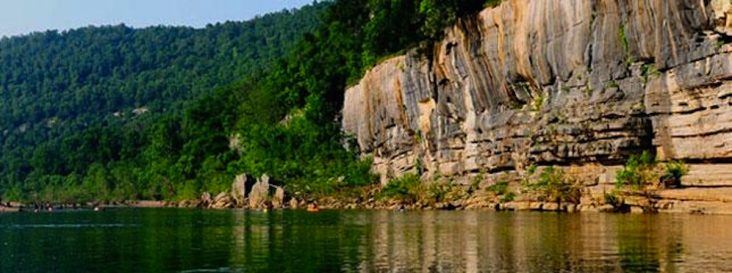Questions remain after report on C&H Hog Farms drilling study near the Buffalo River
by December 1, 2016 5:26 pm 603 views

More research will be necessary to determine whether the waste storage ponds at C&H Hog Farms in Newton County have contaminated the groundwater and soil in the Buffalo River watershed.
On Thursday (Dec. 1), Harbor Environmental and Safety of Little Rock presented its report after drilling to see if hog waste-related pollutants are in the soil and groundwater at the hog farm near Mount Judea.
Kelly Robinson, public information officer for Arkansas Department of Environmental Quality, said it was the first time the report was presented to state agencies, including the governor’s office. About 75 people attended the presentation at ADEQ headquarters in North Little Rock, but it was not a question-and-answer session or an opportunity for public comment.
“This was not the venue to talk to the contractor,” Robinson said.
When asked if hog-related contamination was found in the soil and ground water, Robinson said “that’s something that they are going to have to review.”
The Buffalo River watershed is home to more than 300 species of fish, insects, freshwater mussels and aquatic plans, such as the endangered snuffbox mussel, the endangered Gray bat and the endangered Indiana bat. Designated as America’s first national river in 1972, the Buffalo National River travels freely for 135 miles and is one of the few remaining undammed rivers in the lower 48 states. Popular for camping, canoeing and fishing, it attracts more than 1 million visitors a year.
‘TOTALLY UNSATISFACTORY’
Gordon Watkins, president of Buffalo River Watershed Alliance, was surprised the public was not allowed to ask questions. He had multiple questions for Harbor officials; however, he will submit them online when public comments are accepted. He also was not satisfied with Harbor’s presentation.
“It was short and sweet,” Watkins said. “Totally unsatisfactory.”
While Harbor staff “didn’t come out and say there was no evidence of contamination,” that there wasn’t any found “was the gist of it,” he said. “In a way we’re relieved. We don’t want to see contamination.”
But the drilling was not “industry standard,” he added. Harbor should have drilled at multiple sites on the property to test for contamination. Yet, until Watkins and other state agencies have the opportunity to review the full report, the results are unclear.
“We’ll have plenty to say once we read this report,” Watkins said.
ADEQ staff were working to upload the report on its website as of late Thursday afternoon.
The alliance had pushed for the drilling study after receiving 250 pages of documents from the U.S. Geological Survey in January, Watkins said. It previously filed a Freedom of Information Act request. In the documents, an email exchange showed possible waste movement and some reason for concern. In April, the alliance presented this to the Arkansas Pollution Control and Ecology Commission, and it was news to the commission and ADEQ, he said.
In 2015, an electrical resistivity imaging survey by Big Creek Research and Extension Team showed possible leakage from the waste storage ponds and fracturing within the limestone bedrock below the site, according to Harbor’s site investigation work plan. On Aug. 2, Harbor rolled out the C&H drilling project plan.
On Sept. 26, ADEQ announced Harbor had completed field testing. Cascade Drilling drilled to a depth of 120 feet testing for hog waste-related pollutants in the soil and groundwater and filled the hole with cement. Drilling took place between Sept. 21-26, Robinson said. Cost of the study has yet to be determined.
In a Nov. 23 statement, ADEQ director Becky Keogh said she was “pleased that the report has been completed a month ahead of schedule, while conforming to rigorous quality controls and assurances inherit in an independent-scientific review.”
HOG FARM FUTURE
C&H Hog Farms is capable of housing 6,500 swine, and opponents of the farm fear waste runoff will pollute nearby Big Creek, a tributary of the Buffalo River six miles away. As of Oct. 31, the farm’s Reg. 5 permit expired, but the farm can remain in operation while its application for a new permit is being reviewed, Watkins said.
“The department suspended review of C&H Hog Farm’s permit application while the drilling study was being conducted because it was determined this data was necessary when reviewing the permit application,” Robinson said in an email. “As indicated today, the department will review Harbor’s report and issue a determination based on the results. That determination will be considered when review of the draft permit resumes.”
In September, Gov. Asa Hutchinson created the Beautiful Buffalo River Action Committee. The committee recently announced a series of public meetings to receive feedback on the development of a Buffalo River Watershed Management Plan. FTN Associates, a Little Rock-based environmental consulting company, will host the meetings, the first of which will start 9:30 a.m. Dec. 8 at Searcy County Civic Center Gym in Marshall.
Potential pollution from hog farms will be a controversial issue the committee faces. In August 2015, the Pollution Control and Ecology Commission ordered a five-year ban on new permits for large swine factory farms on the watershed. Those affected by the hold on permits includes farms with at least 750 swine weighing over 55 pounds or 3,000 swine weighing less than 55 pounds.
